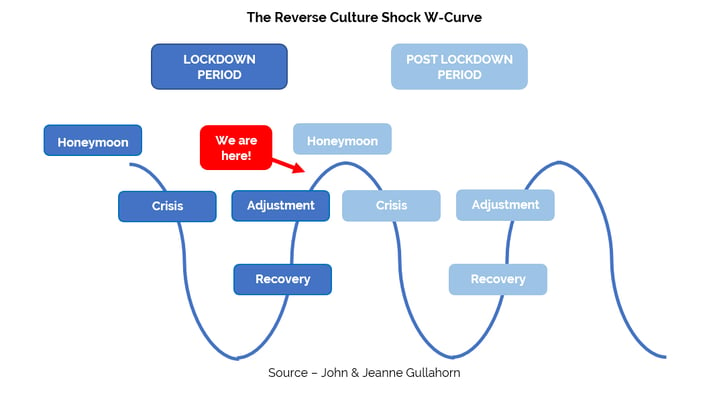To better help us understand and prepare ourselves, our teams and our organisations to manage the emotional, cultural and practical challenges of the post-lockdown phase, we need to identify where we're at in our journey and what type of personal support, conversations and interventions people will need.
Looking at this through the lens of culture shock and reverse culture shock – which mimics the route from familiar to unfamiliar/different and back again - is one way in which we can do this.

As our world and consciousness expands with new experiences we move through a honeymoon phase – responding to the different sights and sounds that offer a fresh perspective on the daily routine of life. We then start to dip as we miss the familiar and try to work out how we fit into this new and different space. As we get used to the new way of living, we start to adopt aspects of our new life and way of being into our own routines, patterns and thinking and move into a more positive space as we adjust into the situation.
At the point at which we leave the new environment and return we will move through a similar ‘U’ curve – which usually feels far more intense than the original adjustment and leads to longer periods of feeling unhappy, unmotivated and even depressed. In a reverse culture shock space, this dip can also be very prolonged mainly because those around us don’t understand the different experience that we’ve had and how we have changed.
For our current situation, this is where we have a real advantage to move through the dip in a more conscious, faster and supportive way as we have ALL collectively had the experience.
So as we head into this new phase, there’s a big task ahead for organisations and leaders within them to create time and space for people to process this experience and be involved in a wider discussion about what the future looks like.
This is not to say that some previous practices won’t be welcomed and relished when a sense of normality returns – being around people again, having a physical space in which to come together to create connection, separating home life and work life – but expecting things to snap back and erase this time and the learning and growth from it is a non-starter. Because the reality is that we cannot go back – especially now that we collectively know that we can do things differently.
What then might individuals, teams and leaders need to explore as we step into the next phase?
Individual
Teams
Leaders
What next?
At this moment in time we are all still navigating ambiguity. We don't have a clear steer externally as to when and what will happen next, which in turn is acting as a feeding agent to our anxieties as our psychological safety continues to be challenged.
So, the opportunity is to focus on what is in our control right now. For individuals, teams and leaders this includes – growing our own insight through honest conversations, creating space for ourselves and others to experience and name emotions, reflect on what we have individually and collectively learnt from the experience and engage in thoughtful exploration of how we can integrate and adapt for the future.
How would you like to start a conversation? Click on the icons below, or use our interactive video tool.